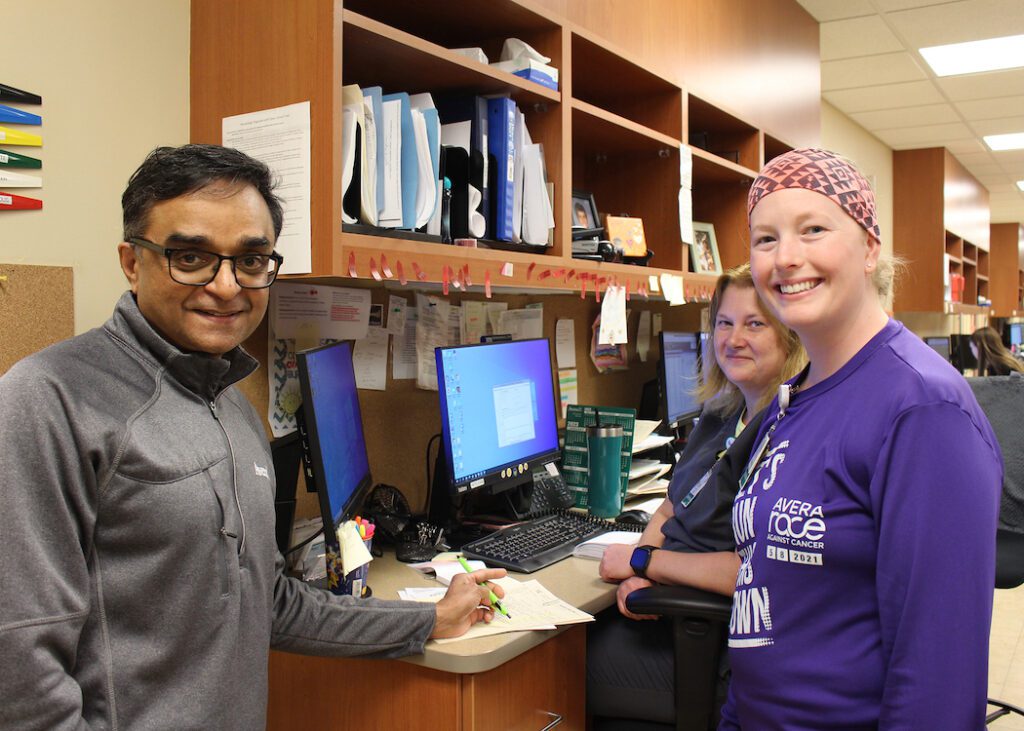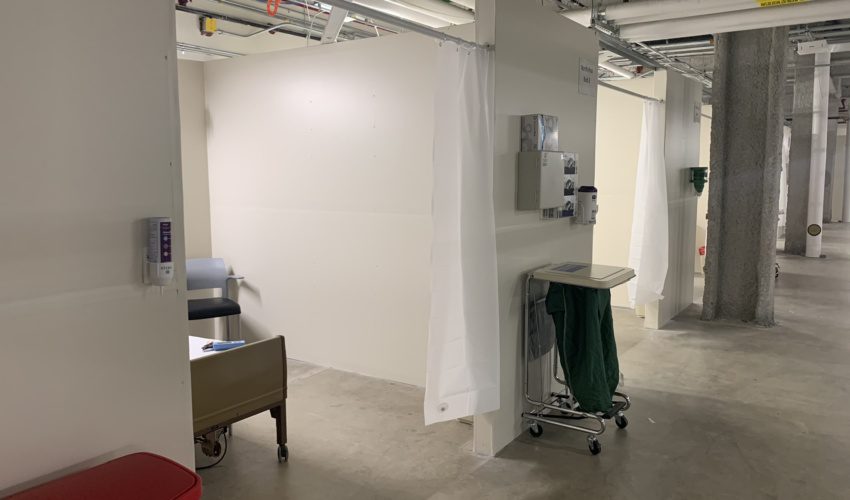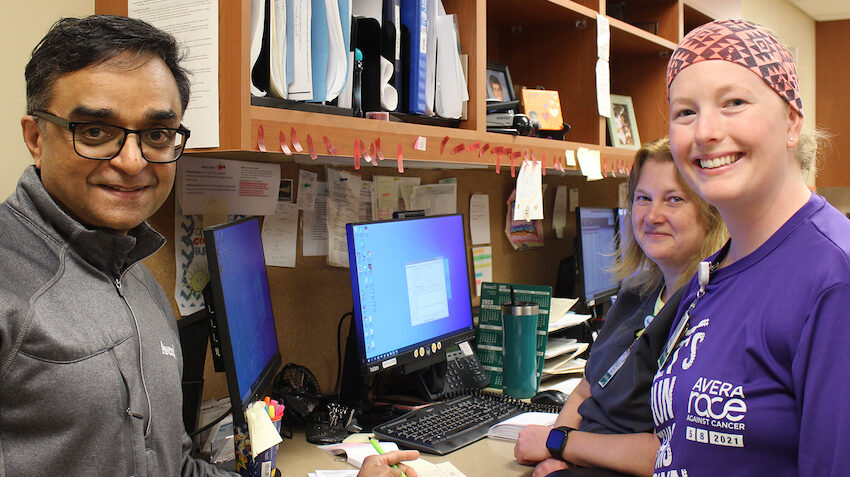How Avera’s hematology, transplant team innovates to save lives
May 22, 2023
This paid piece is sponsored by Avera Health.
For over two decades, Avera’s blood and marrow transplant program has been giving patients a second chance at life with innovation that makes care not only leading edge but also personal.
Avera Medical Group Hematology, Transplant & Cellular Therapy, located within the Avera Cancer Institute in Sioux Falls, is the region’s most comprehensive clinic to offer this specialized care. “Our evolution as a team allows us to offer the same level of care as nationally known cancer centers, right here in South Dakota,” said Dr. Vinod Parameswaran, FRCPath, MRCP(UK).
Since 2001, this specialized program has served hundreds of families around the U.S. and many others around the world with its research. “Patients here know they’re more than a number. We know them. We know their families,” Parameswaran said.
Dr. Vinod Parameswaran and clinic registered nurses Shelby Hoferer and Lisa Sayler.
In fact, Parameswaran and his colleagues, Dr. Xavier Andrade-Gonzalez and Dr. Waqas Jehangir, are known to scour national literature to find solutions for patients who may not be getting the best response from standard of care. They take part in national clinical trials and initiate their own trials to investigate possible solutions.
“Our specialized providers handle anything from iron-deficiency anemia to aggressive acute leukemia, and we have board-certified transplant physicians capable of treating patients with cutting-edge cellular therapy,” said Parameswaran, who serves as clinic medical director.
Depth of expertise in transplant care
In the past, blood and marrow transplant used to be more commonly called bone marrow transplant. Thanks to the latest medical advancements, patients and donors can take medications that move stem cells from the bone marrow into the bloodstream. These cells can be harvested through a process known as apheresis – similar to donating blood – whereas in the past bone marrow was harvested via a surgical procedure.
This transplant builds up the body’s immune system after a strong regimen of chemotherapy to kill cancer cells. For patients with a blood cancer like leukemia, lymphoma or multiple myeloma, it can lead to long-term remission or even a cure. “Patients often call their transplant day their second birthday. It’s literally a second chance at life for these patients,” said Lacey Roberts, Avera administrative director of hematology, transplant and cellular therapy.
Avera’s program has been fully accredited by the Foundation for Accreditation of Cellular Therapy since 2004. It’s accredited for autologous, or self, and allogeneic, or donor, transplants, as well as immune effector cell therapy, for delivery of chimeric antigen receptor T-cell therapy.
“Accreditation means we meet the benchmarks for our patient volumes, quality guidelines and other metrics,” Roberts said. “Only programs with considerable depth of expertise, experience and infrastructure can achieve these qualifications.”
A patient’s case will dictate what type of transplant they can have – either allogenic or autologous, Parameswaran said. “Being accredited to do both means we can treat a wider range of diseases.”
Avera Hematology, Transplant and Cellular Therapy has developed its own specialized lab to support stem cell processing. The team also uses the latest solutions to resolve some of the major side effects of blood and marrow transplant, including graft-versus-host disease.
Evolving technologies that Parameswaran and his colleagues adopt can minimize chemotherapy impacts for patients. Their work also reduces complications after transplant and lessens the burden of side effects.
“The strides we’ve made demonstrate how our team uses the latest research findings for our patients,” Roberts said. “The hours of review and investigation have one goal: the best possible solutions for each person we treat.”
Patients benefit from the expertise of weekly case conferences, specialty certified pharmacists, social workers, transplant-certified registered nurses and transplant coordinators who provide holistic care and guidance through everything from side effects to insurance and dedicated processing laboratory technicians.
“We become part of the family for patients,” Roberts said. “We’re at their side, each step of the way.”
Location is a serious consideration. “Sometimes, a patient’s cancer care journey unfolds over months or more than a year, and being close to home makes a huge difference,” Parameswaran said.
Latest innovations in cellular therapy
The depth of Avera’s program has allowed physicians to offer the latest innovations in cellular therapy, including CAR T-cell therapy and TILS, or tumor-infiltrating lymphocytes. In these types of therapies, the patient’s cells are harvested and then manufactured and reprogrammed to fight the specific cancer that person faces.
Avera treats patients with methods that other cancer care centers might see as future possibilities.
“We include approaches in cellular and gene therapy right now – they’re the current reality in care that our patients can get today,” Parameswaran said. “Our clinical team’s research and desire to seek every new breakthrough is why we continue to find patient-specific treatments that improve rates of remission.”
In some cases, treatment that Parameswaran and his team can offer now was not possible five years ago. “We’ve helped establish the leading-edge standard of care,” he added.
Avera’s team also employs treatment options such as genetic modification, where a patient’s cells are used to fight cancer.
“We’ve advanced the use of gene therapy-based approaches in our work,” Parameswaran added. “Some of these advancements are so new that they weren’t available for patients just a few months ago.”
FACT serves as an accreditation organization as well as a worldwide network of cancer-fighting peers. “Since we’re part of a global network of experts, yet close to our patients in the Midwest, we can find unique solutions that save lives,” Parameswaran said. This includes contributing to an international database.
“When we help a patient in Sioux Falls, we also might be able to help one in Texas, Germany or around the world,” Roberts said. “That’s why I love this work. When we can celebrate those successes with patients and families, it makes it all worthwhile.”
Learn more about cancer care at Avera.








